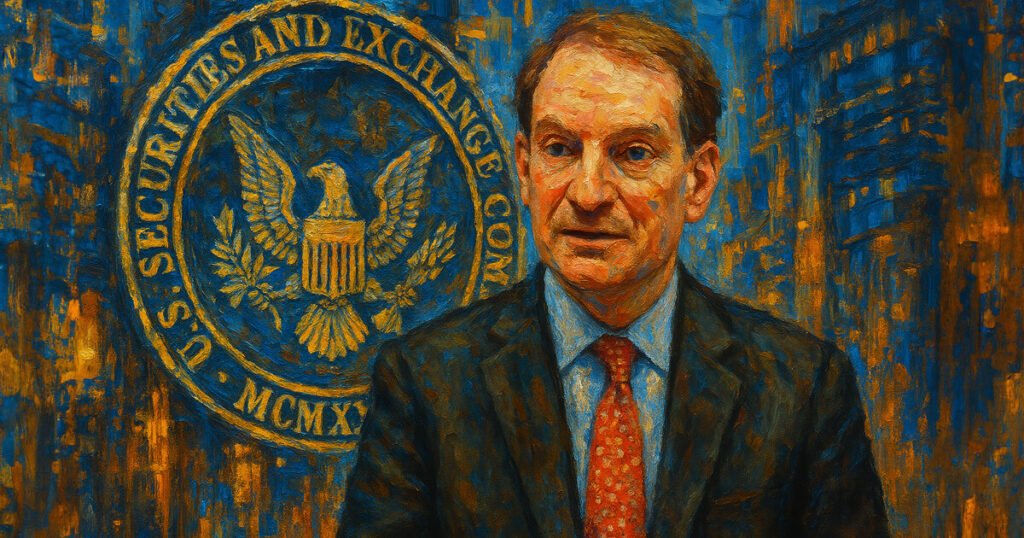The SEC’s New Direction Under Paul Atkins: A Shift Towards Digital Asset Innovation
On April 9, 2023, the United States Senate confirmed Paul Atkins as the new Chair of the Securities and Exchange Commission (SEC), with a narrow vote of 52-44. This decision marks a significant departure from the regulatory strategies implemented by former Chair Gary Gensler, whose enforcement-led approach dominated the SEC’s operations. Backed entirely by Senate Republicans, Atkins brings a wealth of experience from his previous tenure as an SEC Commissioner (2002-2008) and his role as a long-time consultant on Wall Street. His confirmation hints at a new era focused on recalibrating the SEC’s relationship with digital assets, paving the way for innovative regulatory frameworks while ensuring investor protection.
Having progressed through the Senate Banking Committee prior to his confirmation, Atkins is poised to serve until June 2026, succeeding Acting Chair Mark Uyeda. Uyeda’s brief leadership commenced after Gensler’s resignation in January and has already implemented deregulatory measures such as dismissing ongoing crypto-related enforcement actions and repealing key internal rules that restricted crypto custody for public companies. Notably, Atkins has previously led Patomak Global Partners, a consultancy that specializes in risk strategies for financial and digital asset firms, and played an advocacy role with the Token Alliance, indicating both his industry expertise and vested interest in the evolving landscape of cryptocurrency. His ethics filings reveal significant personal investments in crypto, amounting to up to $6 million, underscoring his alignment with the sector.
Atkins’ upcoming leadership at the SEC signifies a philosophical shift from Gensler’s aggressive enforcement paradigm. While Gensler executed over 100 enforcement actions against what he viewed as speculative and noncompliant crypto practices, Atkins advocates for a more structured regulatory landscape that fosters digital asset innovation. During his confirmation hearing, he underscored the importance of establishing a rational framework to navigate the complexities of digital currencies, while working collaboratively with the Commodity Futures Trading Commission (CFTC) and Congress to clarify jurisdictional boundaries. This approach aims to reposition the U.S. as a leading hub for Bitcoin and blockchain finance, consciously contrasting with Gensler’s stance on the broader ecosystem, which he deemed largely unsustainable.
As Atkins steps into this substantial role, he inherits a Commission that is already undergoing a transitional dynamic. Following Uyeda’s lead, the SEC has begun to reduce its regulatory burden on the digital asset sector. Internal guidance has been released to exempt certain class assets from securities classification, and an internal task force has been dedicated to engaging with industry stakeholders—a precursor to Atkins’ expected policy direction. Industry stakeholders anticipate a swift review and eventual codification of policy changes, notably in the area of exchange-traded fund (ETF) approvals. Pending applications for tokens such as XRP and Solana may soon be prioritized as the SEC formally distinguishes between decentralized and centralized digital assets, marking a pivotal inflection point for the capital markets and their interactions with tokenized instruments.
Broader implications of Atkins’ leadership extend beyond just the crypto realm. His perspective on deregulation resonates throughout traditional markets, highlighting a potential reduction in disclosure requirements and a simplification of capital formation rules for private companies. During the confirmation process, Atkins expressed interest in revisiting the criteria for accredited investors, suggesting that financial knowledge—rather than mere net worth—should influence access to private markets. Senate Banking Committee Chair Tim Scott welcomed Atkins, predicting that his appointment would usher in much-needed regulatory clarity for digital assets. Conversely, concerns have been raised by figures like Senator Elizabeth Warren, who criticized Atkins’ strong ties to Wall Street and questioned his advisory connection with firms like FTX.
The newly confirmed Chair now faces the task of reorienting the SEC amidst ongoing federal staff reductions. With pressure mounting to redefine the agency’s regulatory playbook, Atkins must navigate institutional continuity while executing his vision of a more accommodating regulatory environment for digital assets. This transition entails reshaping enforcement priorities, possibly revitalizing self-regulatory organizations for digital markets, and opening dialogues about the SEC’s role in an increasingly digital and decentralized financial landscape. The coming months will be critical as the industry awaits decisive actions that will influence the future of financial regulations, compliance, and innovation in digital assets.
In conclusion, Paul Atkins’ confirmation as the Chair of the SEC symbolizes a transformative shift towards a more innovative regulatory framework for digital assets. By promoting a balanced approach that prioritizes both investor protection and market innovation, Atkins sets the stage for a new chapter in the SEC’s oversight of cryptocurrencies and financial technologies. As the agency navigates its evolving responsibilities, the industry hopes for clarity and collaboration, shedding light on the burgeoning world of digital finance. His leadership may very well redefine the landscape, ensuring that the U.S. remains competitive in the global financial ecosystem while fostering a regulatory environment that encourages growth and development.


